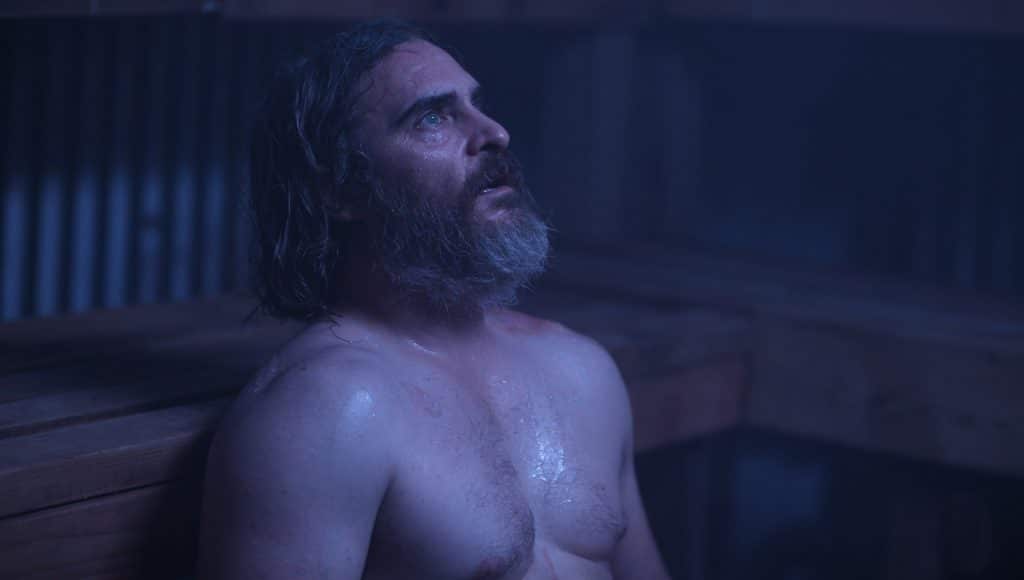Defying expectations with an atypical thriller, Lynne Ramsay creates a surprising character study that benefits from a stellar performance by Joaquin Phoenix
You Were Never Really Here (2017)
Written and directed by Lynne Ramsay, based on the novel by Jonathan Ames. Starring Joaquin Phoenix, Ekaterina Samsonov, Alex Manette, John Doman, Judith Roberts and Alessandro Nivola.
Joaquin Phoenix is an actor who never ceases to surprise me with each new film and nuance in his performances. Versatile like few others of his generation, he gives life to types that can be completely different from one another — like the aggressive, self-hating Freddie Quell from The Master (2012), the sweet and lonely romantic Theodore Twombly in Her (2013), or the hippie stoner PI Larry “Doc” Sportello from Inherent Vice (2014). This time, in You Were Never Really Here, Phoenix gives us another masterclass in acting range with a character that doesn’t speak so much and yet lets us see a broken soul in each move, line or outburst of violence.
Adapted by the talented Scottish director Lynne Ramsay (We Need to Talk About Kevin) from Jonathan Ames’ book of the same name (which I’ve never read), You Were Never Really Here may sound at first like a new Taxi Driver (1976) or Taken (2008), but don’t be fooled by the cover. The point of the film is not to explore loneliness-driven urban insanity like the former or to be an escapist revenge flick like the latter, but to be something quite different — both in terms of its thematic ambitions and the way it defies what you would normally expect from a thriller.
The plot follows Gulf-War veteran and former FBI agent Joe (Phoenix), who suffers from PTSD and employs his brutal ways to rescue kidnapped girls as a hired gun. While caring for his frail elderly mother in his childhood home in New York, he is tormented by violent memories of his childhood and his past in the military. But when Joe is hired to rescue the abducted 13-year-old daughter of a New York State Senator who is offering him a large sum of money, he gets pulled into a hellish conspiracy involving corrupt politicians and federal agents — a situation which, in turn, offers him the possibility of redemption or perhaps a way out of his growing insanity.
Depicted as a sullen, unkempt man whose emotions seem to be constantly at a boiling point, Joe is shown to be strictly objective when performing the jobs he is hired for: we see him cleaning up a hotel room, erasing all evidence and making sure no one can tell what ever happened there. Later, a call from the airport to his client (“It’s done”) concludes the impersonal business. But from then on, we also begin to understand that Joe is as damaged as John Rambo, prone to self-asphyxiation with a plastic bag (which would indicate trauma from abuse) and tormented by a dark past that insists on invading his mind in occasional flashbacks.
You Were Never Really Here draws a complex picture of a fragmented mind (notice how Joe even tears off pages from a book while reading it backwards) and is elevated by an intelligent direction. Opting to show us the aftermath of violent scenes (due to budget constraints), Ramsay often keeps the actual violence offscreen, like when we witness a massacre through black-and-white surveillance cameras to the sound of elevator music. As we move from one camera to the next, Joe is always “caught” when he is already leaving a body behind — and Ramsay’s subtlety is remarkable, especially as we notice the Senator’s daughter’s dilated pupils afterward.
While the hotel room where Joe hides the girl elicits discomfort with a bleak, cold palette, the fight that follows between him and a corrupt cop is made excruciatingly tense as Ramsay keeps the camera as close as possible to the two men. And if she is able to unsettle us with squirmish moments like the view of a tooth being pulled out, she balances those scenes with a great deal of tenderness when Joe holds hands with a dying killer or has a vision underwater — not to mention how she makes us care about Joe’s mother in such a short screen time, a merit also of Judith Roberts, who sensibly combines loony eccentricity and vulnerability.
Even so, two things stand out in You Were Never Really Here above all else: first, the fantastic score composed by Radiohead guitarist Jonny Greenwood with its dense electronic beats and anguishing, dissonant strings that reflect the protagonist’s inner tumult. The second, as I said before, is Joaquin Phoenix, who manages to convey a world of hopelessness, desperation and emotional unbalance all at once in the same composition — and the cathartic moment when Joe breaks down in an empty room represents perhaps the most astonishing and devastating performance of his entire career, right there with what he accomplished in The Master.
Actually, a great part of what makes Ramsay’s film so good is Phoenix’s complete surrender to his role and to the ugly madness that accompanies those who are turned into monsters by a vicious world. In the end, Joe (whose name couldn’t be more appropriately ordinary) is a living carcass, powerless and unable to save anyone who is as broken as himself. When it comes to thrillers, few directors have been able to leave me this uncomfortable like Lynne Ramsay.





